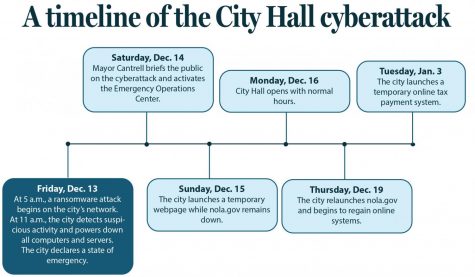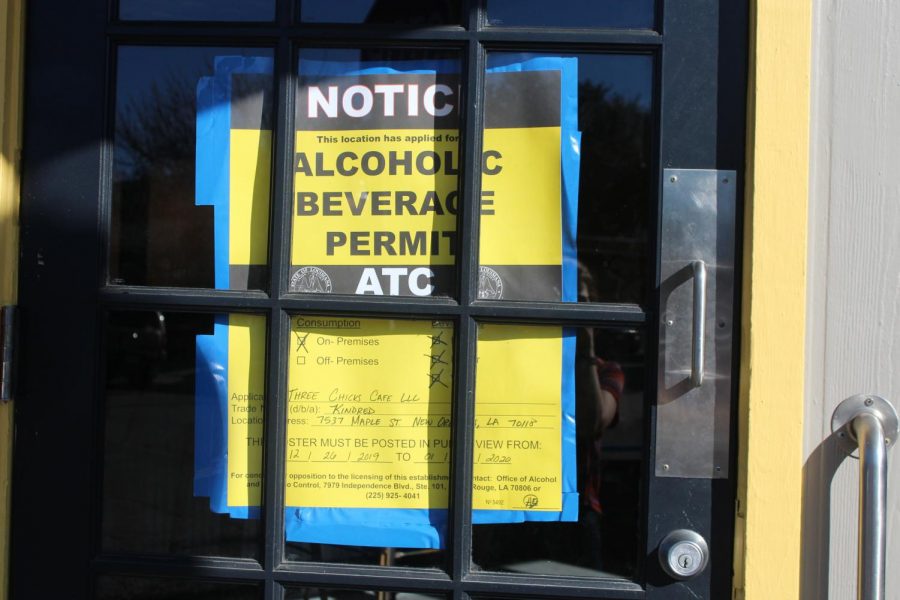City Hall processes permits by hand in the wake of cyberattack
An alcoholic beverage permit approved by the city is displayed on the front door of the newly opened restaurant Kindred on Maple Street in Uptown on Jan. 8. In the aftermath of the Dec. 13 cyberattack on New Orleans City Hall, all city permits are being processed by hand.
January 13, 2020
Nearly a month after a Dec. 13 cyberattack on New Orleans City Hall forced the shutdown of government computers, employees in the Department of Safety and Permits are still doing a city’s-worth of paperwork by hand, leaving the future of some business owners’ permits up in the air.
“I can’t get an occupancy permit, I don’t know if anyone can get an occupancy permit,” said Oliver Kodner, owner of Brewstock, a homebrewing supply store.
Kodner’s store relocated for the new year, requiring him to change his address in addition to renewing his occupancy permit, paperwork that allows the space to legally function as a business. Kodner went to City Hall the week after the cyberattack and a week before his permit was set to expire, only to be told he would have to wait to apply until the permit expired and then file paperwork by hand with the office.
“I am still open. There is nothing that is going to stop me from operating. If I wasn’t operating, then I would go under and if I wasn’t operating then the city wouldn’t be able to collect taxes from me,” Kodner said of operating with a now expired occupancy permit for his business.
While the city is collecting property taxes through a temporary online portal and will honor posting dates for mailed in forms, all city permits are only being handled in-person.

“I am going to go to City Hall and I am probably going to waste my entire morning going to City Hall. I don’t really know what to do,” Kodner said.
Director of Safety and Permits Zachary Smith acknowledged that the cyberattack has created problems for both the city and people in need of permits, lengthening the average wait time for customers from approximately 15 minutes to upwards of an hour.
Caroline Nassrah, owner of the newly opened uptown vegan restaurant Kindred, said that while the process of obtaining all of the proper permits for her new business, including an alcohol beverage permit, required a substantial amount of handwritten paperwork due to the cyberattack, she found the process to be easy.
“Surprisingly the permit process was easier for me,” Nassrah said. “I got them surprisingly fast. Even the liquor representatives were like ‘What?!’ I guess I just really lucked out.”
Smith said the department has processed nearly 5,000 applications since the cyberattack despite having about a 25% staff decrease at the time of the attack, due to pre scheduled holiday vacations.
“We very quickly mapped out a process to wrangle an in person process without a computer system that has worked quite well,” Smith said. “Our general population of foot traffic is about 250 here at City Hall and the monday before the new year changed, we had over 400.”
This increase in foot traffic is due in part to typically online customers having to file in person, but Smith said the problem runs deeper.
“We temporarily lost some access to historical documents,” Smith said. “It has created an inconvenience to our customers and us to require anyone who had existing permits that were already in the queue to refile those permits in person.”
Anyone who was working with the city to obtain a permit prior to the cyberattack had to restart the process, but Smith said he is hopeful that when the city repairs and reboots the computer systems, the department will once again have access to old permit applications.
If this is the case, the department will have to work on converting the paperwork from the time between the cyberattack and the reboot into digital files, a process that Smith says is going to put pressure on the department, but that the staff will be able to accomplish.
“We are going to continue to receive 100% of our applications and also have to take all of our paper copies and make them digital. Is that going to be a headache? Absolutely. Is that going to be a time crunch? Absolutely. Is it going to be back to normal the day we have 100% of our computers? Absolutely not,” Smith said.
When it comes to the timeline of getting the permit department’s system back online, Trey Caruso, press representative for City Hall, said the city is focused on a
department-by-department approach that prioritizes rebooting departments related to public
safety such as the police department before addressing the rest of City Hall. In the interim, Smith said anyone in need of a permit should bring all documents received from the city to City Hall and be aware that the department is only accepting payment by check and money order.
While the department is still processing all of its work by hand, Smith said that the cyberattack is mainly an inconvenience.
“The business of the city is being done, the business of the department is being done,” Smith said.
An alcoholic beverage permit approved by the city is displayed on the front door of the newly opened restaurant Kindred on Maple Street in Uptown on Jan. 8. In the aftermath of the Dec. 13 cyberattack on New Orleans City Hall, all city permits are being processed by hand.
Caroline Nassrah, owner of the newly opened Uptown restaurant Kindred, brings an order of food out of the kitchen on Jan. 8. Nassrah is one of many New Orleans business owners who had to file paperwork by hand with the city to obtain permits after a Dec. 13 cyberattack led to the shutdown of the city’s computers.








